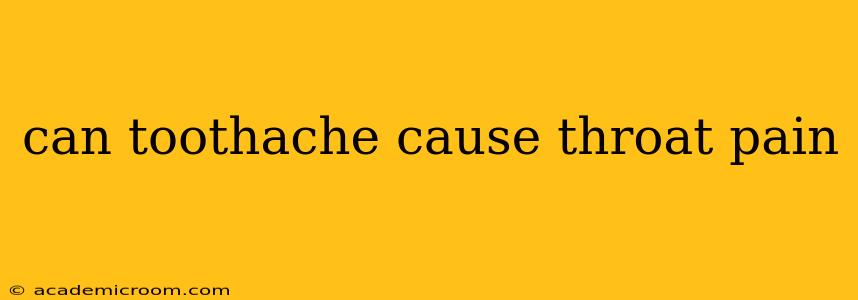A toothache is rarely a standalone issue. While the pain is concentrated in your teeth and jaw, it can often radiate or trigger discomfort in other areas, including your throat. This connection isn't always direct, but understanding the potential pathways can help you seek appropriate treatment.
How Can a Toothache Lead to Throat Pain?
Several factors can explain why a toothache might cause throat pain:
1. Referred Pain: This is the most common explanation. Nerve pathways in your head and neck are complex and interconnected. Pain signals from your teeth can sometimes be misinterpreted by your brain as originating from your throat. This is because the nerves supplying the teeth and throat share similar pathways. The intensity of the referred pain can vary, sometimes feeling like a mild soreness and other times a more significant ache.
2. Infection Spread: A severe tooth infection (abscess) can spread to surrounding tissues, including the throat. This is a serious complication and requires immediate dental attention. Symptoms might include swelling in the jaw, difficulty swallowing, and a noticeable bad taste in your mouth in addition to the toothache and throat pain.
3. Postural Changes: When experiencing a toothache, you might unconsciously alter your posture to minimize discomfort. This can lead to muscle strain in your neck and throat, causing secondary pain.
4. Swallowing Difficulties: A significant toothache might make swallowing painful, leading to discomfort and tension in the throat muscles. This is particularly true if there is swelling or infection present.
5. Irritation from Drainage: An infected tooth might drain pus or fluids, which can irritate the throat and cause a sore throat-like sensation. This is less common but possible, especially with advanced infections.
What if I have a Toothache and Throat Pain?
If you're experiencing both a toothache and throat pain, it's crucial to seek professional help. Don't delay treatment, especially if the pain is severe, accompanied by swelling, fever, or difficulty swallowing.
What should I do?
- See a dentist immediately: This is the most important step. Your dentist can diagnose the underlying cause of your toothache and recommend appropriate treatment, preventing the infection from worsening.
- Over-the-counter pain relief: Consider taking over-the-counter pain relievers like ibuprofen or acetaminophen to manage discomfort until you can see a dentist. Do not self-medicate for an extended period.
- Gentle rinsing: Gently rinsing your mouth with salt water can help soothe any irritation, but this is not a substitute for professional dental care.
Can a Sore Throat Cause Tooth Pain?
While less common, a sore throat can sometimes indirectly lead to tooth pain. This usually happens due to muscle tension in the jaw and neck, which can radiate pain to the teeth. If you suspect this might be the case, addressing the sore throat (through rest, hydration, and potentially over-the-counter remedies) might alleviate the tooth pain. However, always consult a dentist or doctor to rule out other dental issues.
When Should I Seek Immediate Medical Attention?
Seek immediate medical attention if you experience:
- Severe toothache and throat pain
- High fever
- Swelling in the face or jaw
- Difficulty swallowing or breathing
- Pus or drainage from the affected area
Addressing both toothaches and throat pain requires prompt and appropriate medical intervention. While a connection might exist, accurate diagnosis and treatment are essential to prevent complications and ensure your overall oral and general health. Don't hesitate to contact your dentist or doctor if you have any concerns.
